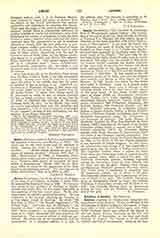

Alnico, FRANCESCO, one of the greatest theologians of his time, b. at Cosenza, in Naples, April 2, 1578. He entered the Society of Jesus in 1596. For twenty-four years he was professor of theology at Naples, Aquila, and Gratz, and, for five years, chancellor in the academy of the last named place. To his eminent science he united a profound humility. He was scholastic in his method, adapting his treatises to a four years’ course of teaching. He wrote “De Deo Uno et Trino”; “De Natura Angelorum”; “De Ultimo Fine”; “De Fide, Spe, et Charitate”; “De Justitia et Jure”, which was prohibited, June 18, 651 “donec corrigatur”, on account of three propositions in it, which Alexander VII and Innocent XI objected to. The corrected edition of 1649 was permitted. He wrote also on the Incarnation, and the sacraments. In a complete edition, it is said, in the preface, that “his doctrine is according to St. Thomas, and is brief, clear, subtle, and solid.”
T. J. CAMPBELL

